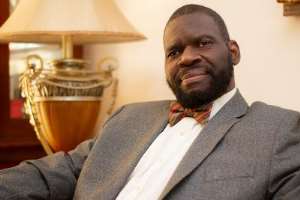
I need to point out that I know none of these men, nor have I dealt with them in any capacity now or in the past. I am only here to give a psychological picture of what I call the Buharian image of the Nigerian space; "Nigerians are the problem." A mass problem that is further complicated by the media, where the influence of money and power has taken charge of journalism at the behest of media ethics.
In the last few hours, the Nigerian media has been filled with what appears to be bombshell election news surrounding Bola Ahmed Tinubu, pointing out that in his educational declaration on new INEC forms he did not show names of primary and secondary schools.
At no point did Tinubu say he had no primary or secondary school education. Even if he is not able to show the concrete certificates, whether due to being lost or accidentally damaged, how does that show he has no basic educational background?
One thing is certain: he is a Nigerian-educated person who earned a Bachelor of Science Degree in Business and Administration with a major in accounting from Chicago State University in 1979.
In past election seasons, through media hysteria, President Muhammadu Buhari, also an American trained military scientist with post-secondary education, was said not to have a WAEC certificate and, so, he is not eligible to vie for any elective position. Let's say that Buhari's basic educational certificates were with the military, like he said, or they could not be located, what cannot be denied by the American government is that Buhari holds a diploma from the United States Army War College.
On the part of Atiku Abubakar, the media has it that he holds a secondary school education, although not of the highest level. He has post-secondary education in hygiene science and a diploma in law, and in recent times he has worked hard and now has a master’s degree in International Relations from the United Kingdom. Atiku was even questioned about his citizenship, which was not his fault as an infant because the part of Adamawa State where he was born was under the territory of Northern Cameroon, not Nigeria, which later joined Nigeria.
This illogical media and political idiocy were triggered on Atiku who once worked for the Nigerian Customs Service, once won the governorship of Adamawa State, and served as the Vice President of the country for eight years.
What is most stunning about the current uproar is that a basic education such as a primary or secondary school certificate is required to be president, as in the case of Tinubu. In 2019, it became a settled matter when the Supreme Court held that Buhari, per the constitution, is not required to possess a secondary school certificate to be qualified to run for the presidency and does not have to submit it to the Independent National Electoral Commission (INEC) to run for the presidency.
Yet in a society where lawlessness and lack of respect for operating laws are rampant, the media and the people should be asking the presidential candidates about how they will handle monumental problems like crime and security, poverty, unemployment, poor electricity, infrastructure and road hassles, illegal substitution of candidates' names, and human rights abuses.
With ridiculous media reports like those noted above, the world's negative perception of Nigeria continues, especially in a world of social media where nothing is hidden globally.
This makes me wonder why at a time when the G7 summit being hosted by Germany discussing matters like hunger, poverty, and health will invite nations like Senegal and South Africa over and over, as well as others, but Nigeria, Africa's largest economy with high-level vulnerable economic problems, seems to be left out.
Maybe we need to start changing our ways by reducing disinformation, misinformation, and the habit of denying reality. If Nigeria is to grow in its democratic systems and civic institutions and protect itself from the deliberate process of subverting its future, it must change.
Prof. Oshodi wrote in via [email protected]




 Tuesday’s downpour destroys ceiling of Circuit Court '8' in Accra
Tuesday’s downpour destroys ceiling of Circuit Court '8' in Accra
 SOEs shouldn't compromise on ethical standards, accountability – Akufo-Addo
SOEs shouldn't compromise on ethical standards, accountability – Akufo-Addo
 Father of 2-year-old boy attacked by dog appeals for financial support
Father of 2-year-old boy attacked by dog appeals for financial support
 Jubilee House National Security Operative allegedly swindles businessman over sa...
Jubilee House National Security Operative allegedly swindles businessman over sa...
 Nobody can order dumsor timetable except Energy Minister – Osafo-Maafo
Nobody can order dumsor timetable except Energy Minister – Osafo-Maafo
 Mahama wishes National Chief Imam as he clock 105 years today
Mahama wishes National Chief Imam as he clock 105 years today
 J.B.Danquah Adu’s murder trial: Case adjourned to April 29
J.B.Danquah Adu’s murder trial: Case adjourned to April 29
 High Court issues arrest warrant for former MASLOC Boss
High Court issues arrest warrant for former MASLOC Boss
 Align academic curriculum with industry needs — Stanbic Bank Ghana CEO advocates
Align academic curriculum with industry needs — Stanbic Bank Ghana CEO advocates
 Election 2024: We'll declare the results and let Ghanaians know we've won - Manh...
Election 2024: We'll declare the results and let Ghanaians know we've won - Manh...
